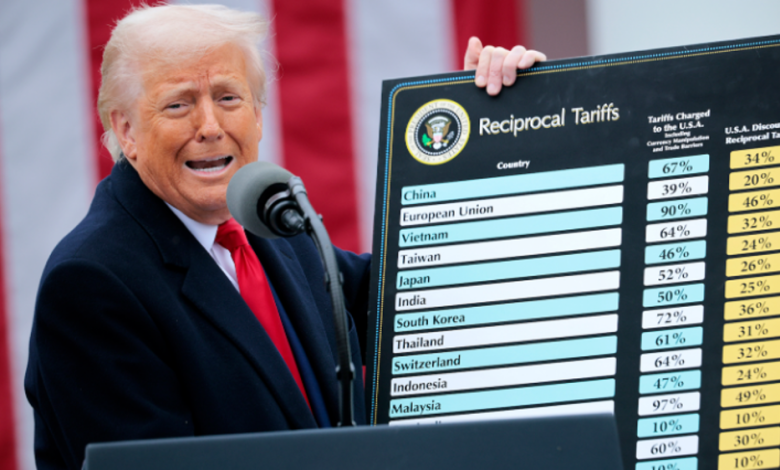Global Markets Reeling as Trump Tariffs Ignite Outrage
Trump's comprehensive tariffs on imports have sparked global threats of retaliation, prompting governments and companies to quickly devise countermeasures to lessen the impact of the U.S. move.

On Wednesday, Trump enacted a 10% baseline tariff on all imports entering the United States, alongside imposing higher targeted tariffs on certain major trading partners.
Trump announced on social media that the operation has concluded successfully, with the patient surviving and currently in the recovery phase.
French President Emmanuel Macron on Thursday urged European firms to halt their intended investments in the United States.
French President Emmanuel Macron emphasized the necessity for thorough evaluation in a meeting with French industry leaders, suggesting that any upcoming or recently announced investments should be paused until matters with the United States are clarified. This pause is deemed essential to ensure strategic alignment and address prevailing uncertainties.
China, the world’s second-largest economy, has pledged to retaliate against Trump’s imposition of 54% tariffs on imports. In a parallel move, the European Union has declared its intention to implement measures in response to the United States’ 20% duty.
China on Thursday called on the United States to swiftly revoke its latest round of tariffs, while pledging retaliatory actions to safeguard its own interests.
According to a statement from China’s Ministry of Commerce, the United States’ recent action undermines the equilibrium achieved through multilateral trade negotiations over the years and overlooks the substantial benefits it has historically gained from participating in international trade.
The European Union has declared its intention to implement measures in response to the United States’ imposition of a 20% tariff. EU Chief Ursula von der Leyen stated that the repercussions could be severe for millions of individuals worldwide.
The German Economic Institute (IW) has projected that the imposition of tariffs is poised to erode 750 billion euros ($833.63 billion) from the European economy.
Germany’s Economy Minister, Robert Habeck, has proposed strengthening economic relations with Canada and Mexico. These nations, recognized as the United States’ significant trading partners, have thus far remained unaffected by the tariffs.
“He emphasized that new opportunities for alliances are emerging and should be pursued with determination and decisiveness.”
Trump has previously pressed NATO allies to increase their defense expenditures.
South Korea, Mexico, India, and a number of other U.S. trade allies announced their decision to postpone immediate action, as they pursue negotiations for concessions ahead of the scheduled implementation of the tariffs on April 9.
Mexican officials announced their intention to persist with negotiations with the Trump administration.
Canada has announced plans to revamp its economic structure to reduce reliance on the United States, while also pledging to respond to Trump’s tariffs with retaliatory measures.
Canadian Prime Minister Mark Carney announced on Thursday that he engaged in discussions with German Chancellor Olaf Scholz to explore the expansion of trade relations between the two nations.
In response to the challenges posed by Trump’s tariffs, the importance of dependable trade partners has reached a new peak, he remarked on social media.
Trump has imposed a 24% tariff on Japan and a 25% tariff on South Korea, both of which host significant US military bases. Additionally, Taiwan faces a 32% tariff under the new trade measures.
Reports reveal that the tariffs implemented under Trump’s administration have reached historic highs, marking the steepest increase in over a century. Consequently, imports entering the world’s largest consumer market are now subject to an average duty of 22.5%, a significant rise from just 2.5% the previous year.
The implementation of “reciprocal tariffs” has triggered significant global upheaval, signaling the conclusion of a lengthy period of trade liberalization that has long influenced the international economic landscape.
Trump asserts that the action is a retaliatory measure against obstacles placed on American products. However, the list of targets encompasses not only international allies but also uninhabited Antarctic islands and economically disadvantaged nations in Africa.
The administration has announced that the implementation of tariffs is aimed at fostering the creation of manufacturing jobs domestically while also expanding export markets internationally. However, officials have advised that the anticipated outcomes will require time to materialize.
Economists have evaluated that the imposition of tariffs could potentially trigger a resurgence in inflation, elevate the likelihood of a recession in the United States, and result in increased expenses for the average American household by thousands of dollars. This development poses a significant challenge for Trump, who has pledged to lower the cost of living for the American populace.







